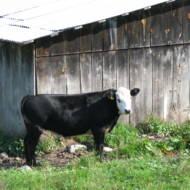
The festival of Sukkot corresponds to Jacob, who did something revolutionary by building huts for his cattle.
It is taught that each of the three Jewish festivals correspond to a different Patriarch. Passover corresponds to Abraham because he served food to the angels who came to visit him after his circumcision. Shavuot corresponds to Isaac because the shofar that was blown when God gave the Torah on Mount Sinai came from the ram that was sacrificed in place of Isaac. Finally, Sukkot corresponds to Jacob because Jacob built huts for his cattle.
The Hebrew word for “huts” is “sukkot”. Indeed, the place where these huts were built was also re-named “Sukkot.”
The question is asked: There were life-changing events behind the connection between Abraham and Passover and Isaac and Shavuot. But the connection between Jacob and Sukkot seems bland and hardly special. OK, so he built huts for his cattle. That’s nice. And does it make sense that they renamed a city because Jacob built some huts?
It is explained that the connection between Jacob and Sukkot is indeed life-changing. That’s because Jacob did something revolutionary for his cattle that was never yet done in world history: He built them huts! He gave his animals shelter! Until that time,animals were always kept exposed to the elements. So what Jacob did was indeed life-changing, certainly for the animals, and worthy of changing the name of the city to commemorate the first place in the world where such a deed was done.
Furthermore, jumping ahead a bit, when Joseph was being tempted to sin by Mrs. Potiphar, we are told that he began to think to himself: “How can I do this? Her husband was so nice to me. How can I be so ungrateful by committing such a terrible act?”
What prompted Joseph to have these “second thoughts”? Our sages say that at that moment, the image of his father – Jacob – appeared to him and this stopped him from sinning.
So what is the connection between Joseph not sinning and the episode of Jacob building huts?
The reason Joseph did not sin was because he learned appreciation from his father. We see this from the fact that Jacob once sent Joseph to “Please go check on… the welfare of the sheep…”
A person must show appreciation to animals that give us food, clothes and often a source of livelihood. Judaism teaches that one who benefits from anything must show appreciation, even if the benefactor neither knows nor cares that appreciation is being shown. That is why Jacob showed appreciation to sheep as well as why Moses showed appreciation to the Nile River.
This attribute of showing appreciation was something that Jacob instilled in his son Joseph, and this is what prevented Joseph from sinning with his boss’ wife.
Care for animals. Show appreciation to anything and everything. Now we can understand the deep life changing-connection between Jacob and Sukkot, and by extension, the Jewish character trait of always showing thanks and appreciation.
By: Rabbi Ari Enkin, Rabbinic Director, United with Israel

